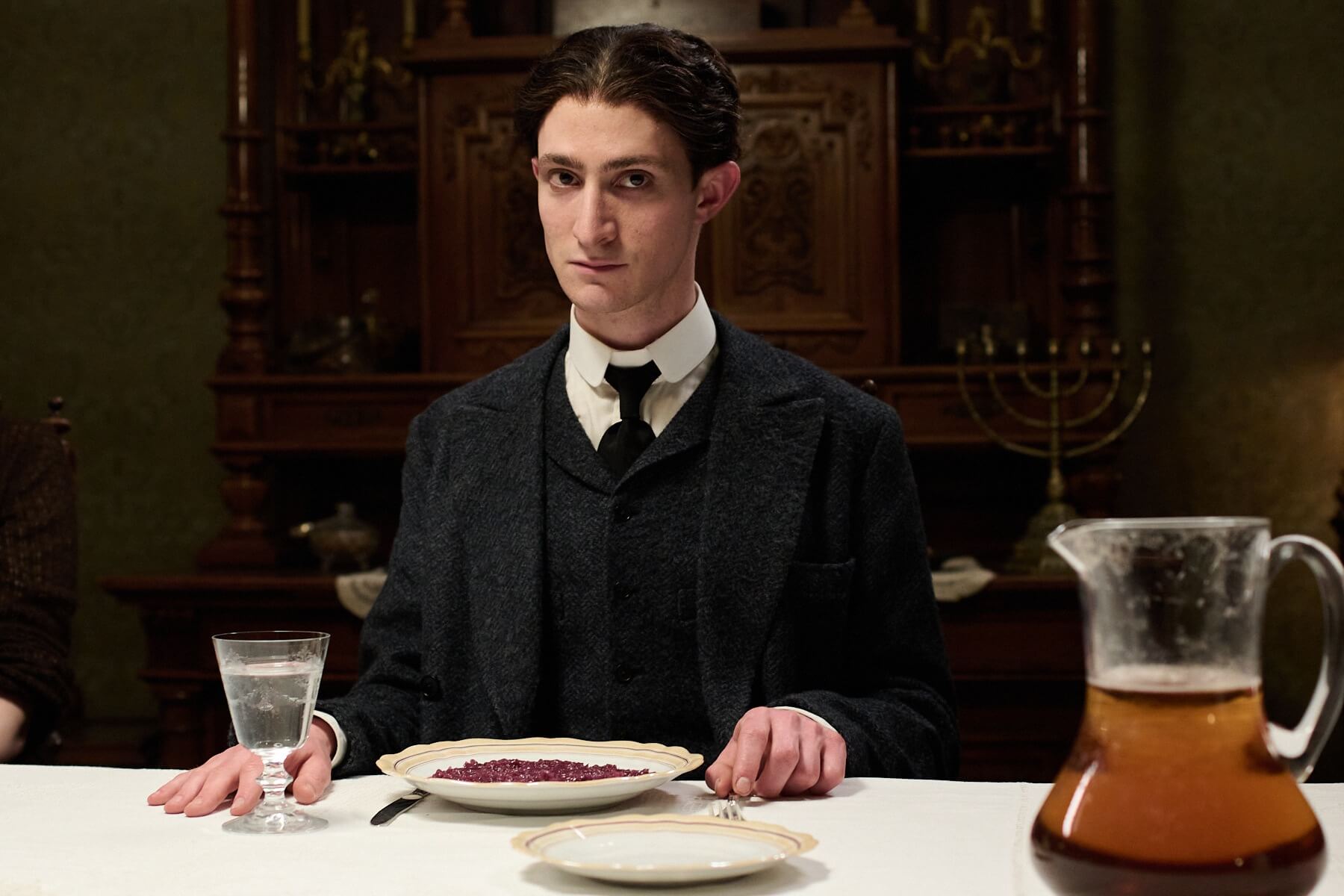A dizzying Kafka biopic that isn’t really Kafkaesque
Agnieszka Holland’s ‘Franz’ imagines the author as a saint of modernity

Idan Weiss as Franz Kafka in Franz. Courtesy of Film Boutique
When Franz Kafka died of tuberculosis in 1924, his bequests included a literary style destined to supply an overused adjective and reshape the way we view the world. What he didn’t leave us, aside from his handwriting and some drawings, was a definitive aesthetic.
For Orson Welles, in The Trial, Kafka meant buzzing bureaucratic fluorescents, chiaroscuro lighting that dug trenches into the faces of Josef K’s inquisitors, shadows stretched to spindles down alleyways. Steven Soderbergh’s 1991 Kafka-as-detective treatment toggled between black-and-white and color. A 2024 German-Austrian miniseries lent Kafka’s biography the just-so symmetry and fondness for curios found in Wes Anderson’s work. Agnieszka Holland’s biopic Franz, making its world premiere at the Toronto International Film Festival Sept. 5, has all the Belle Époque trappings, and never misses a camera trick.
On the steep streets of Prague, Kafka demands change of a beggar, the world and people behind him tiered at levels that seem to go on endlessly. The vertiginous play with vertical space is matched with deep and shallow focus and documentary-style whips of the camera as Kafka’s family, friends and love interests, existing out of time and addressing us, explain what he was like.
In one scene, which best illustrates the power of Kafka’s work, he reads from In the Penal Colony, and we are positioned below his lectern — maybe all this shifting perspective is right for a man whose best known work describes the dizzying transformation of a human to a bug.
Working with a script she co-wrote with Marek Epstein, Holland, the Polish director perhaps best-known for 1990’s Europa Europa, has more tricks up her sleeve.
As Kafka (an aptly sallow Idan Weiss) goes through the stations of his life — cast outside in the night by his father (Peter Kurth) as a child; unlucky in love with his Zionist fiancee Felice Bauer (Carol Schuler); returning from World War I to his cacophonous family home — the film teases him with the legacy he’ll never see.
As he settles into his new apartment, he’s greeted by the prying eyes of 21st Century tourists, peering into a facsimile of his abode at the museum devoted to him in Prague. When he goes for one of his legendary swims, a tour group from Japan settles down by the bank in the spot of grass that he favored. Others eat at a restaurant called “Kafka Burger,” a dig at how the great writer (famously a vegetarian) has been commodified as an icon.
Is this Kafkaesque?
Certainly these detours to the present are disorienting, recalling, in their strange way, the Auschwitz museum ending of Jonathan Glazer’s Zone of Interest (Holland ends the film with suggestions of the Shoah, in which Kafka’s sisters, a lover and many friends were murdered; his confidant Max Brod made it out, barely, with Kafka’s manuscripts, disobeying his friend’s desire to have them burned).
These particular ruptures of reality don’t really feel of a piece with Kafka. We are more anxious about his influence than he ever was.
One can’t show his impact in a conventional biography, beginning, say, with his traumatic swimming lessons with his father, Hermann, ending in a sanatorium with a spurt of consumptive blood. While the recent miniseries — co-written by novelist Daniel Kehlmann — opted to present the life by showing how it blurred into the fiction, and Soderbergh’s jaunt blended the stories with a mystery to be solved, Holland’s concern is posterity.
Toward the end of the film, a museum docent states “perhaps no writer has influenced the way of thinking and writing in the 20th Century as deeply as Franz Kafka.” This is telling, not showing, even if the museum in Prague has a helpful display, physically contrasting Kafka’s slim, surviving work, with the endless words written about it.
The unacquainted will have to take the film’s word for it, as it mainly shows snippets of Kafka reading from his stories in between the usual display of his quirks — his philosophy talk with a sex worker; his excessive chewing; his tendency to laugh uncontrollably at inappropriate moments. His prophetic sense of impending horrors, the detached, arbitrary and bureaucratic cruelty that would haunt the rest of the century, are almost nowhere alluded to, even as we see their manifestations in the yellow star stitched to his sister’s coat in a flash forward.
We know we are to admire the man, whose sensitivity and eye for the absurd shaped the reality we live in. As Brod says, in one of those documentary-style testimonies,“He had the innocent charm of a martyr.”
The cause he was martyred for is an open question. If it’s glib to say modernity, the movie seems to believe it nonetheless.

















